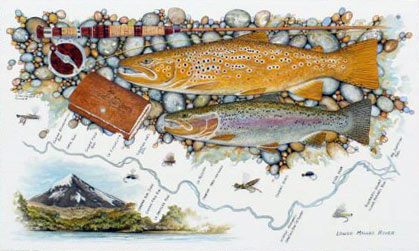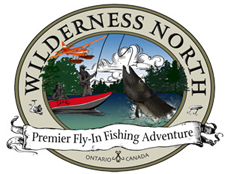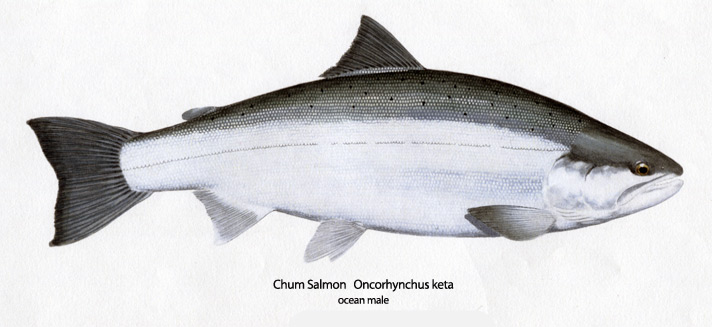Chum Salmon, December 2011, Fish of the Month!
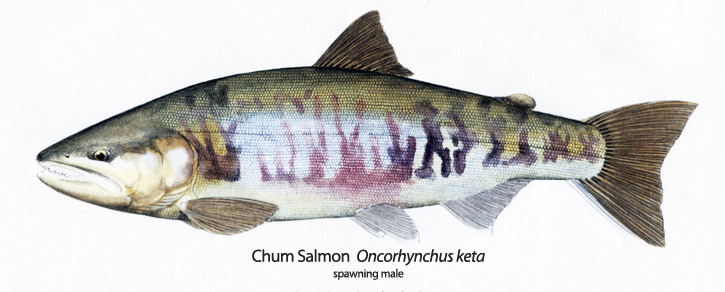
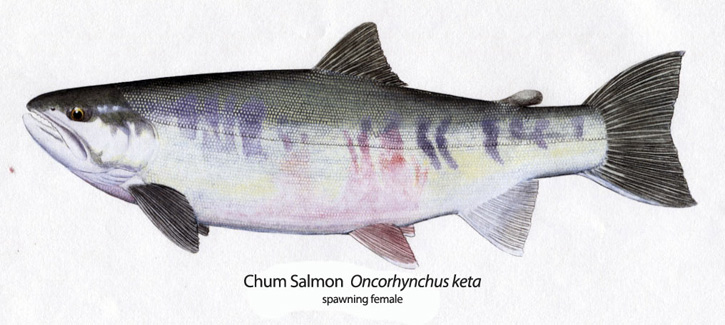
Chum Salmon
Oncorhynchus keta
Local Names:
Dog Salmon, Chum, Calico Salmon,
Fall Salmon, Keta, Hayko, Qualla
Average Size:
24 to 32 inches
8 to 12 pounds
Distinguishing Field Marks:
Color and color pattern are reliable distinguishing field marks for this species. (See the illustrations.)
- A few very small black spots on the upper back
- The anal fin has a white tip
- There are 13 to 17 rays in the anal fin
- The tail fin is slightly forked
North American Range: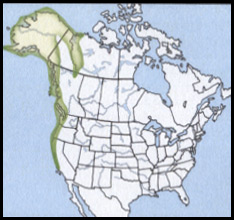
Map to the right shows approximate range in North America.
Diet:
In their shorter spawning streams, young-of-the-year Chum salmon do not feed when out-migrating. In longer rivers they feed on small immature insect larvae, especially midges. When at sea, young and adults feed on small invertebrates then graduate to larger fare, including shrimps, squids, and fish. Adults returning to spawn in their natal streams do not feed.
Fly Fishing for Chum Salmon:
Like the Pink salmon, Chum salmon have not received the fishing attention given to Chinook and Coho salmon. Historically, a few local anglers would troll for Chum salmon with bait and lures in near-shore salt waters.
The recent expansion of everything fly-fishing has seen a growing number of fly-fishers encountering wild Chum salmon on their up-stream migrations and found them to be strong fighters of very respectable size. Although they do not feed in fresh water, Chum salmon will take a well-presented wet fly tied in bright colors and with plenty of flash.
Fly equipment for Chum salmon should be in the 7 to 9 weight class. Especially in the larger rivers, Chum salmon may be up-migrating with Chinooks and Cohos, so, for these waters, the heavier end of that spectrum is advised. For any salmon fishing, a reel with large backing capacity and a smooth reliable drag is a necessity.
As is the case with all anadromous fish species, successful fishing outings will depend on careful study of the water to be fished. Local on-stream knowledge is best and visiting fly-rodders should invest in getting to know the locals through guide, outfitting, and tackle services.
Because, this is not a “glamour” fish, it will probably be many more years before the Chum salmon takes its rightful place with Steelhead, Chinook salmon and Coho salmon. Because of that status, Chums will likely continue to be incidentals that save a not-so-good salmon fishing trip to waters within their broad range. But, as the WWII saying goes, “Smoke ‘em if you got ‘em.”




